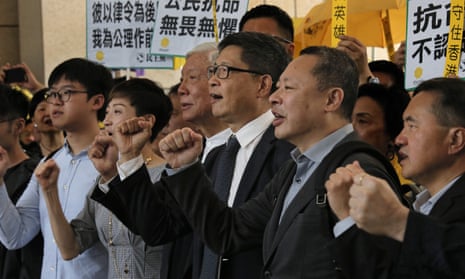A group of Hong Kong pro-democracy activists have been sentenced to prison for their role in the Umbrella Movement protests, with two of its leaders jailed for 16 months.
A district court judge jailed sociology professor Chan Kin-man, 60, law professor Benny Tai, 54, and Baptist minister the Rev Chu Yiu-ming, 75, to 16 months each for conspiracy to commit public nuisance. Chu’s sentence was suspended for two years.
The men were the founders of the social movement Occupy Central with Love and Peace and were among nine pro-democracy campaigners convicted over their leadership in the “umbrella movement” rallies in Hong Kong in 2014, which triggered a massive city-wide strike for democratic elections.
The group were found guilty earlier this month on rarely used colonial-era public nuisance charges for their roles in the 2014 protests calling for free elections, the largest civil disobedience movement in the city’s history.
District court judge Johnny Chan said none of the defendants expressed any regret.
“Regret does not mean giving up their political beliefs or demands, but regret for the inconvenience or sufferings experienced by the public,” Chan said. “It is an apology the public rightly deserves from the defendants but was never received.”
Raphael Wong and Shiu Ka-chun were sentenced to eight months while former student leader Eason Chung and Democratic party member Lee Wing-tat were given eight-month sentences suspended for two years.
Tommy Cheung was given a community service order of 200 hours. After the hearing, he walked through a crowd of supporters, stunned.
“I don’t think they deserved a 16 month sentence. I was quite shocked,” he said. “I don’t think people who fight for Hong Kong society should be treated like that.”
Tanya Chan’s sentencing was delayed to June after revealing she needed a scan for a brain tumour. Her counsel said the issue was life-threatening. Chan, who blinked back tears as she hugged her fellow defendants, will be sentenced on June 10.
Outside of court, hundreds of chanting supporters wearing yellow, the colour of the protest, waved banners.
Some wore yellow T-shirts with a slogan written in Chinese: “I was not incited”. It was a sly criticism against one of the colonial-era charges lodged against several defendants: inciting others to cause public nuisance.
“Thou shall not speak. That’s the message,” said Kam Tsang, a veteran protester who held aloft a banner that urged “Fight for Universal Suffrage.”
Man-kei Tam, Amnesty International’s Hong Kong director, said: “Today’s appalling jail sentences … are an affront to justice and the human rights to peaceful protest and freedom of expression. All four are prisoners of conscience imprisoned solely for peacefully advocating for democracy for Hong Kong, and they must be immediately and unconditionally released and have their sentences overturned.”
Maya Wang, the Hong Kong-based chief researcher for China at Human Rights Watch, said the sentences sent “a chilling warning to all that there will be serious consequences for advocating for democracy”.
Public officials, including Chris Patten, Hong Kong’s last governor when it was under British rule, rebuked the government for bringing charges so long after the event.
The activists planned to use civil disobedience tactics and occupy Hong Kong’s central business district in hopes that Beijing would allow Hong Kong voters to choose the city’s leader for the first time in history in 2017.
The Occupy Central founders planned a sit-in of two or three days. The protests were joined by a large number of university students who stormed a civic square near the government headquarters. After the police doused the crowd in pepper spray and tear gas, tens of thousands of residents joined the action.
In his ruling issued earlier this month, the judge agreed that Tai, Chan and Chu had requested that the protest remain peaceful, but said that the concept of civil disobedience was not a defence to a criminal charge.
